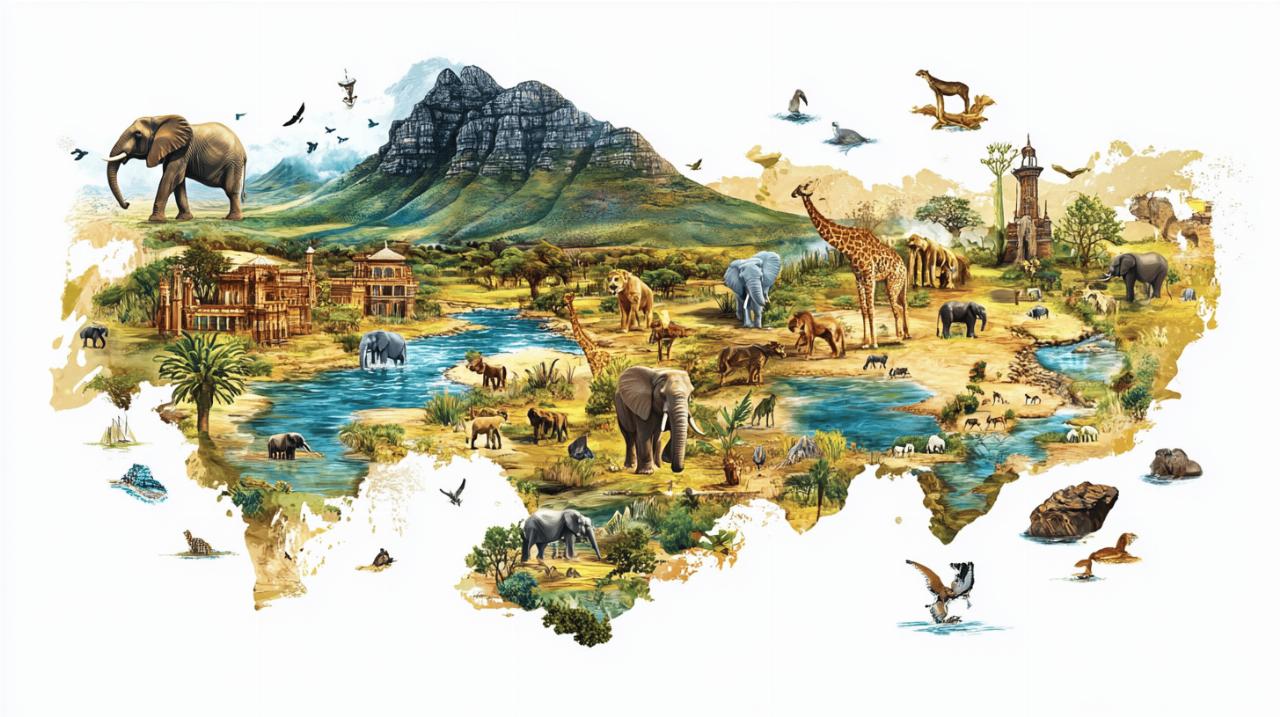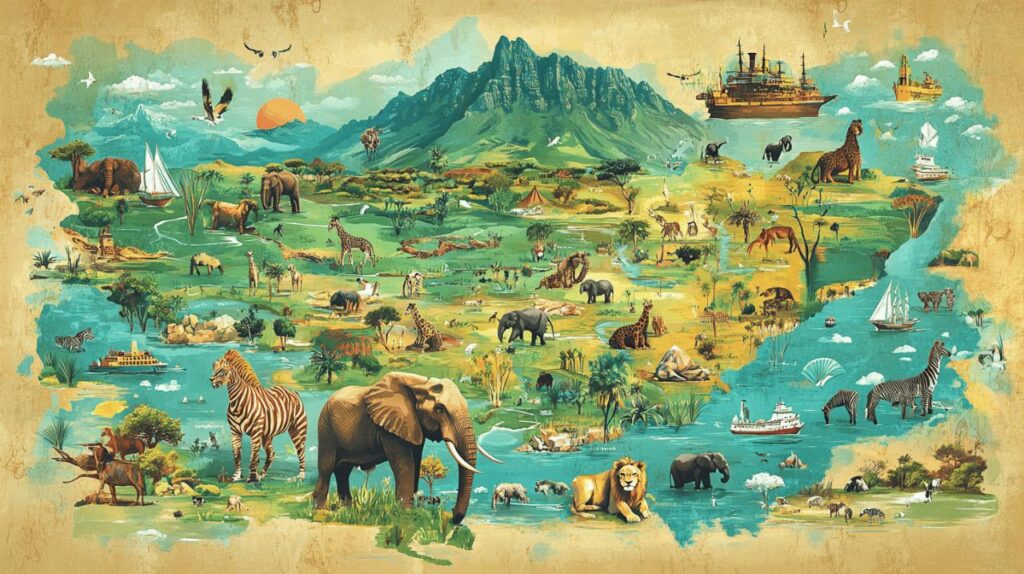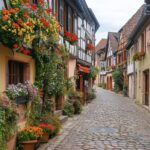South Africa beckons with a rich tapestry of experiences that extend far beyond its renowned wildlife reserves and breath-taking landscapes. For travellers seeking to delve deeper into the soul of this remarkable nation, the country's galleries and museums offer an unparalleled journey through time, art, and culture. From the bustling metropolitan hubs to quieter regional centres, these institutions preserve and celebrate the stories that have shaped South Africa into the diverse and vibrant destination it is today. Whether you're drawn to contemporary artistic expression, fascinated by ancient human origins, or eager to understand the complex historical narratives that define the nation, South Africa's cultural institutions provide thoughtful and engaging encounters at every turn.
Unveiling south africa's artistic heritage: essential galleries and museums
The cultural landscape of South Africa is extraordinarily diverse, reflecting centuries of human creativity and historical complexity. With over three hundred museums scattered across the country, visitors have countless opportunities to engage with collections that span prehistoric archaeology to cutting-edge contemporary art. These institutions serve not merely as repositories of artefacts but as active spaces for dialogue, education, and reflection. The museum map of South Africa, recently updated in 2025, provides an essential resource for those planning their cultural explorations, ensuring that travellers can navigate the wealth of options available across the provinces. This comprehensive approach to mapping cultural heritage demonstrates South Africa's commitment to making its history accessible to both domestic and international visitors.
Cape town's leading cultural institutions: from contemporary art to maritime history
Cape Town stands as a cultural epicentre, where world-class museums and galleries nestle beneath the dramatic backdrop of Table Mountain. The city's institutions reflect both its colonial maritime history and its position as a contemporary African metropolis. Visitors exploring the Mother City will discover galleries showcasing cutting-edge African art alongside museums that trace the development of South African society from pre-colonial times through to the democratic era. The maritime museums along the Victoria and Alfred Waterfront tell compelling stories of exploration, trade, and the movement of peoples across oceans, whilst contemporary art spaces in the city centre pulse with the energy of modern African artistic expression. These institutions collectively offer a nuanced portrait of a city that has always served as a meeting point between continents and cultures.
Johannesburg's Museum Quarter: Tracing the Nation's Journey Through Art and Memory
Johannesburg, the economic heartland of South Africa, houses some of the nation's most significant cultural institutions. The city's museums confront visitors with the realities of the country's complex past whilst celebrating its resilience and creativity. The Apartheid Museum stands as an essential destination for anyone seeking to understand South Africa's recent history, offering a poignant and immersive experience that chronicles the injustices of the apartheid system and the triumphant struggle for democracy. Beyond this sobering historical encounter, Johannesburg's cultural quarter includes institutions dedicated to African art, photography, and social history. The city's galleries showcase both established and emerging artists, reflecting the dynamic creative energy that continues to drive cultural production in this vibrant metropolis. These spaces invite reflection not only on where South Africa has been but also on where it might be heading.
Regional treasures: museums beyond the main cities
Whilst Cape Town and Johannesburg dominate the cultural conversation, South Africa's regional museums offer equally rewarding experiences for those willing to venture beyond the metropolitan centres. These institutions often provide more intimate encounters with specific aspects of South African heritage, from local histories to specialised collections that reflect the unique character of their surrounding communities. Travelling between these regional treasures allows visitors to appreciate the geographical and cultural diversity that defines the nation, revealing stories that might otherwise remain hidden in the shadow of larger urban attractions.
Coastal Cultural Centres Along the Garden Route and Eastern Cape
The scenic Garden Route, celebrated for its natural beauty, also harbours cultural institutions that illuminate the region's layered history. Museums along this coastal stretch explore themes ranging from the indigenous Khoi and San peoples to the arrival of European settlers and the development of coastal communities. The Eastern Cape, birthplace of many anti-apartheid leaders, offers museums dedicated to the struggle for freedom alongside institutions preserving local cultural traditions. These coastal centres often occupy historic buildings that are themselves part of the story, with architecture that speaks to different eras of South African history. Visitors combining outdoor adventures along these spectacular coastlines with cultural encounters will gain a richer understanding of how geography has shaped human settlement and cultural development in this region.
Kwazulu-natal's rich tapestry: exploring zulu heritage and battlefields
KwaZulu-Natal presents a particularly rich cultural landscape, where museums dedicated to Zulu heritage sit alongside battlefield sites that witnessed pivotal conflicts in South African history. The province's institutions celebrate Zulu artistic traditions, from beadwork to ceremonial dress, whilst also confronting the violent clashes that occurred during the colonial period and subsequent wars. Battlefield museums offer guided experiences that bring historical events to life, allowing visitors to stand on the ground where history unfolded whilst gaining insight into the perspectives of all parties involved in these conflicts. The province's commitment to preserving both indigenous cultural heritage and difficult historical narratives demonstrates a mature approach to museum practice that acknowledges complexity rather than simplifying the past into convenient narratives.
Natural history and scientific collections across south africa
 South Africa's significance extends beyond human cultural history into the realms of palaeontology, archaeology, and natural sciences. The country occupies a unique position in understanding both human evolution and biodiversity, making its natural history museums essential destinations for anyone interested in the story of life on Earth. These institutions house collections that span millions of years, from the earliest fossil evidence of life to specimens representing the extraordinary variety of flora and fauna that characterise the African continent today.
South Africa's significance extends beyond human cultural history into the realms of palaeontology, archaeology, and natural sciences. The country occupies a unique position in understanding both human evolution and biodiversity, making its natural history museums essential destinations for anyone interested in the story of life on Earth. These institutions house collections that span millions of years, from the earliest fossil evidence of life to specimens representing the extraordinary variety of flora and fauna that characterise the African continent today.
Palaeontology and archaeology: discovering humanity's cradle
South Africa forms part of what scientists designate as the Cradle of Humankind, a region that has yielded some of the most significant fossil discoveries relating to human evolution. Museums focused on early human history, numbering around twelve according to recent compilations updated in 2025, offer visitors the opportunity to engage with evidence of our species' origins. These institutions present fossil casts, archaeological artefacts, and interpretive displays that explain the scientific methods used to unlock secrets from the distant past. The experience of examining evidence of early hominids and understanding the environmental conditions that shaped human development provides perspective on our place within the broader sweep of natural history. Such encounters remind visitors that South Africa's significance as a tourist destination stems not only from its contemporary attractions but also from its fundamental importance to understanding human origins.
Wildlife and botanical museums: celebrating south africa's biodiversity
Natural history museums across South Africa, thirteen of which focus specifically on this theme according to updated listings from 2025, showcase the country's extraordinary biodiversity. These institutions house specimens representing the incredible variety of life that inhabits the region, from the Big Five animals that draw safari enthusiasts to lesser-known species that play crucial roles in South African ecosystems. Botanical museums and gardens complement zoological collections by highlighting the unique flora that characterises different biomes across the country. These institutions serve educational purposes whilst also contributing to conservation efforts by raising awareness about threatened species and fragile habitats. For visitors who may not have the opportunity to explore remote wilderness areas, these museums provide accessible encounters with South Africa's natural heritage.
Planning Your Cultural Journey: Practical Tips for Museum and Gallery Visits
Maximising the value of museum visits requires thoughtful planning, particularly in a country as geographically expansive as South Africa. Understanding practical considerations such as opening hours, admission fees, and the availability of guided tours can transform a rushed visit into a meaningful encounter with cultural heritage. Fortunately, resources have been developed to assist travellers in navigating the wealth of options available.
Creating your personalised cultural itinerary across south africa
Travellers planning extended visits to South Africa face the pleasant challenge of selecting from hundreds of cultural institutions spread across the country's provinces. Itineraries ranging from brief three-day focused explorations to comprehensive three-week journeys can incorporate museum visits alongside other activities such as safari experiences, coastal relaxation, and urban exploration. Travel specialists familiar with South African cultural attractions can assist in crafting personalised itineraries that balance major metropolitan museums with regional treasures, ensuring that visitors experience the full spectrum of the country's heritage. Whether your interests lean toward contemporary art, military history with thirty-three war and conflict heritage museums identified in recent surveys, or specialised collections focusing on aviation with five notable institutions or railways with eight significant museums, resources exist to help you locate and plan visits to relevant institutions. The Museum Explorer SA website encourages users to submit information about museums not yet included on their comprehensive map, reflecting the dynamic and evolving nature of South Africa's cultural landscape.
Visitor information: opening hours, admission fees, and guided tours
Practical considerations play a crucial role in successful museum visits. Opening hours vary considerably between institutions, with some major urban museums operating extended hours whilst smaller regional facilities may have more restricted schedules. Admission fees similarly range from nominal charges at community museums to more substantial costs at larger institutions, though many offer reduced rates for children, students, and senior visitors. International Museum Day, celebrated in both 2024 and 2025, often brings special programming and reduced admission to participating institutions. Guided tours, whether conducted by museum staff or independent specialists, can significantly enhance the visitor experience by providing context and narratives that might not be apparent from exhibits alone. Many institutions now offer audio guides and digital resources that allow visitors to explore at their own pace whilst still benefiting from expert interpretation. Checking websites or contacting museums directly before visiting ensures that you arrive prepared and can make the most of your time exploring South Africa's remarkable cultural heritage.



